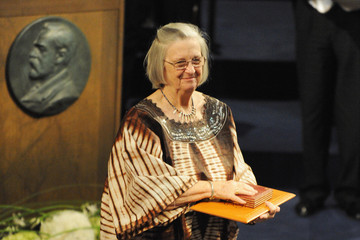A little under a year or so ago, my dear friend Sumana suggested to a group of friends that we read some work by the late political economist and ecologist Dr. Elinor Ostrom and blog our thoughts. Ostrom’s work focused on the natural environment and the possibilities for cooperative management of common resources. It was of interest to the group of us who have been involved in free and open source software and also something I wanted to know about as a long-time member of the co-op movement.

Well, weeks and then months passed and I didn’t have time to turn to the 2009 Nobel prize lecture, “Beyond Markets and States: Polycentric Governance of Complex Economic Systems” that it was suggested we start with. Nor (to my knowledge) did any of the others (well maybe Sumana did, she mentions it at the end of this post). Nonetheless, I still had it as an item on my lengthy digital to-do list, and I received regular reminders that it was something I’d told myself I wanted to do.
As the political tides turned dramatically over the past few months, I turned my attention to deeper study of radical history and alternative socio-political visions. In this spirit, I returned to the long- neglected Ostrom hoping she’d have something to share that would motivate and inspire.
Like most economics research, Ostrom’s is dense and builds on a long history of economic concepts only a few of which I feel I can convincingly discuss, but her work is at its core a rebuke to modern society’s Hobbesian belief that without hierarchical government, people would not be and do good. Her focus was on expanding the categories of goods humans could have, use, produce, and distribute, since traditional economics had long held that there were only two sorts — public and private.
Through studies of the collective management of irrigation systems in Nepal, pastures in Kenya, and water basins in Los Angeles, she observed first-hand how human beings could band together to cultivate and maintain what she calls common pool resources. Common pool resources are goods that differ from more standardly-defined public goods in that they are depletable and also easily accessible; so they must be preserved at the same time that they are enjoyed and consumed. At 28-pages, this summary of her many decades of academic study and field work is relatively brief*; so I won’t bother to summarize her summary, but I will point to a few key ideas that I am keen to pursue further:
- the value of communication (both focused and small-talk) in building goodwill, increasing trust, and producing more favorable outcomes for all users of a common pool resource;
- polycentricity – the idea that a functioning system can have many different and independent centers of decision; and
- the seven design principles of successful systems
- boundaries – user boundaries & resource boundaries
- appropriation and provision – ensuring that costs and benefits are consistent with local environment/expectations and harmonized with each other
- collective decision-making
- monitoring – of users and of the resource
- graduated sanctions – punishment for rule breaking starts out lax and escalates as/if a users’s violations continue
- conflict resolution mechanisms
- minimal recognition of rights – all users have right to make their own rules
- “nested layer” structure of governance when operating within a larger ecological system
I was introduced to Ostrom around the same time that I began to learn more about the life and teachings of anarchist/libertarian scholar and activist Murray Bookchin and his concept of social ecology. Social ecology is the idea that for the good of the Earth and humanity, society should move to a system of smaller communal societies practicing direct democracy, and it seems to dovetail nicely with many of Ostrom’s findings.
Bookchin’s message — as succinctly summed up by Dr. David Schlosberg in his rather critical 2011 lecture on the life and work of Bookchin — was:
- Domination in human societies is not natural.
- We should pay attention to the liberatory and cooperative potential of nature.
- We must recognize the contribution that social movements can make to social thought.
Where Bookchin theorized about the failings of the centralized, hierarchical state, Ostrom observed first-hand its inefficiencies and corruption compared to the systems where participants came together to exercise their usufruct rights. Usufruct is the idea that you can use and profit from but not abuse or sell the common pool resource, and it was a central tenant of social ecology as Bookchin envisioned it.
I have recently been working with various groups on the campaign for single-payer healthcare in New York state, but now that I am digging into Ostrom, Bookchin, and others, I am excited about the ways in which Ostrom’s design principles for successful management of common pool resources might be applied to create an even more free and fair form of healthcare. I am frankly excited about the ways it can be applied to all manner of collective organizations towards a vision of non-hierarchical relations throughout society. I’ll share my thoughts on that at a later date… after I read more Ostrom!
*For now, I encourage you to read the paper or just watch the talk, which I just discovered is available here in video form and is very enjoyable!


Leave a comment